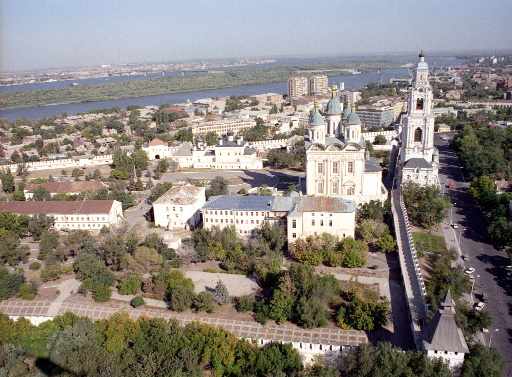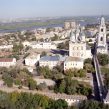
Arrests in Astrakhan Point to the Spread of Islamic Insurgency in Russia
Publication: Eurasia Daily Monitor Volume: 8 Issue: 102
By:

The term “jamaat,” considered native to the North Caucasus in view of the operations undertaken there by the armed resistance, is clearly spreading beyond the region’s borders. The Russian special forces recently did not even attempt to hide the existence of an Islamic underground cell that had been incorporated into a jamaat and operated outside the North Caucasus region: on May 13, it was reported that searches had been carried out in Astrakhan and that two active “jamaat” members had been arrested there (https://news.argumenti.ru/crime/2011/05/106734).
Interestingly, the jamaat group, formed along the same principle as in the North Caucasus, did not appear in the areas adjacent to the North Caucasus region (with its ethnic republics) but sprang up in the Volga region basin, in a strategically important city, which, not unimportantly, is largely populated by Russians. This is an important factor in the study of jamaat formation and operations in Russia.
One can assume, based on the arrests, that the jamaat in Astrakhan does not have a homogenous structure. The last names of those arrested are typical of Dagestanis, as well as Tatars and Russians, which appear to make the group more active and potent given the participation of members from the North Caucasus and from the local population (https://infox.ru/accident/crime/2011/05/14/V_Astrahani_zadyerzh.phtml). One could also sense a level of uneasiness in the reports of law enforcement authorities over the fact that the people who organized and served as active members of the jamaat included local people who were also Russians. Therefore, it is not surprising that the Russian mass media simply specified the number of people arrested, without dwelling on their ethnic affiliations. This is absolutely uncharacteristic of Russian journalists, who usually in their assessments of militant groups point to the ethnic origins of any apprehended native of the North Caucasus region.
Increasingly, reports from the North Caucasus mention non-Caucasian—i.e., Russian—surnames. This suggests that members of the armed underground resistance in the North Caucasus view membership as being based not on ethnic affiliation but on an ideology (devotion to the principles of building an Islamic state) designed to damage the Russian presence in this region. Ethnic Russians who converted to Islam and became shahids (martyrs) on two occasions this year (as was the case, for example, with the Razdobudkos, a husband and wife team of militants) is a case in point (www.lifenews.ru/news/51401). Another case involved Victor Dovrogovsky, who attempted to blow up Russian Interior Minister Rashid Nurgaliev during the latter’s visit to Dagestan (www.kavkazcenter.com/russ/content/2011/01/27/78577.shtml).
The arrest by the Federal Security Service (FSB) and Interior Ministry of a group of armed men in Astrakhan on May 7 this year marked the launch of a large-scale operation against the local jamaat. Those apprehended were suspected of preparing various attacks on policemen. One suspect was actually killed in the course of the operation. Last year, local authorities failed to explain thoroughly the occurrence within a rather short period (40 days) of four armed attacks against local law enforcement agencies in Astrakhan. This time, however, the authorities tried to show that the arrest of militants and the round-up of the jamaat members were completely unrelated. The following day, May 8, authorities detained the brother of the suspect who was killed on May 7. He, too, was charged with extremism (www.regnum.ru/news/fd-south/astra/accidents/1402431.html). Immediately after May 10, Victory Day, Russian information agencies reported on the raids targeting all members of the jamaat in Astrakhan. The reports indicated that 16 members of the local jamaat were detained as a result of 12 searches across the city. Yet, a bit later it became clear that the authorities only managed to keep four people under arrest. All the other detainees were released on condition that they not leave the city (www.kavkaz-uzel.ru/articles/185206/). Unexpectedly for many, the Investigative Committee made a statement denying the arrest of 16 people (https://astrakhan.kavkaz-uzel.ru/articles/185213/), thereby seeking to make less painful the fact that the jamaat had not been actually crushed, as was being reported loudly in the Russian press, but only that individual members had been dealt a blow. The seizure of a grenade and Wahhabi literature, recognized as extremist and prohibited by a Russian court order, testified to the members’ affiliation with the jamaat. The existence of just a single grenade, presumably belonging to people planning to organize terrorist attacks on Victory Day does not sound entirely convincing.
Of course, it was inevitable that propaganda would appear in the Russian media. Interfax, which has long been a voice of the authorities, raised the issue of international terrorism by reporting that the two members of the local jamaat arrested in Astrakhan belonged to an international extremist Islamist organization simply called “Jaamat” (www.interfax-russia.ru/South/news.asp?id=230887). This has already turned into a kind of delusion, with attempts being made to equate the arrests in Astrakhan as being on par with the U.S. fight against international terrorism.
It is significant that this jamaat, whose existence has not been mentioned before in statements released by the Caucasian Emirate, was formed in an area not designated by the North Caucasian armed resistance. Similar jamaats have also been formed and are operating in Mordovia, Nizhnevartovsk, Naberezhnye Chelny, etc, etc. (https://lib.rus.ec/b/214781/read). Thus, one can argue with some degree of certainty that similar jamaats may also be operating in other parts of Russia, regardless of whether or not this is known to the Caucasus Emirate. This means that the jamaat, a structure set up by Salafi Islamic organizations, has started to spread to other parts of the Russian Federation and that these groups appear to be operating independently of the North Caucasian armed resistance.




